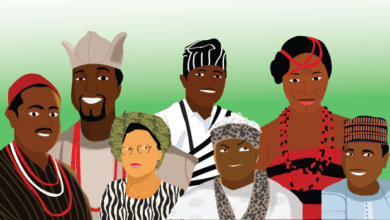
Learn about the rich history of Gwari people of Abuja. Their culture and tradition. They are one of the most resourceful and peaceful tribes in Nigeria.
The Gwari people of Abuja are the real owners of Abuja, the Federal capital of Nigeria. They are also referred to as Gbagyi or Gbari. They are one of the most largest ethnic groups in Nigeria, present in four states namely Niger, Kogi, Nassarawa, kaduna and spread over 31 local government areas in Nigeria. According to the National Population Census in 2006, their population was put at 5.8 million.
👉 Relocate to Canada Today!
Live, Study and Work in Canada. No Payment is Required! Hurry Now click here to Apply >> Immigrate to CanadaThe Gwari people are the largest ethnic group in Abuja, Nigeria hence they hold a very prominent place in the development and growth of the capital city. It would be very difficult to talk about Abuja without mentioning about Gwari people.
How they came about the name Gwari
The word Gwari is a name of a popular yam grown by the Gwari people of Abuja.
Customs and Traditions of Gwari People
The Gwari people are one of the ethnic groups in Nigeria that hold on tightly to their believes and traditions. They have continued to stick to their traditions, despite the rapid urbanization that has occurred on their land. Although the present generation are slowly drifting away from the customs but notwithstanding they still respect their customs.
👉 Relocate to Canada Today!
Live, Study and Work in Canada. No Payment is Required! Hurry Now click here to Apply >> Immigrate to Canada- Placing of goods on the shoulder
One of such customs of Gwari women is the placing of goods however heavy on their shoulder. Gbari women believe the head represent the king of the entire body; hence it should not be disturbed. It is quite interesting to find out that this custom is still been practiced among the Gwari people up till now.
They call the part of their body they place their goods as Bwapa. Gwari women believe the load feel lighter on their shoulders than on their heads. Another reason why this tradition has been upheld till now is that younger ones observe the older ones, hence they take it as a norm.
The Gwari men however are not expected by tradition to carry loads. They believe it was ordained by their ancient God not to carry loads.
- Marriage
Marriage among the people of Gwari is soaked in deep tradition. When a man announces his interest in a woman, he would have to serve 7 years in the bride’s father’s farm, laboring and supplying grains and other produce to the bride’s house in order for her to be well fed. These days, the people of Gwari seem to be aware of the power of money; the groom simply pay the bride’s price instead of serving 7 years in the bride’s father’s house.
Brief History
It has been claimed that the Gwari people migrated from Borno into the Abuja region (Thurley, 1931) due to conflict with the Kanuri. Additionally, Gwari familiarity with the lapis lazuli stone has been taken in some quarters as indication of Egyptian origin.
The question of Gwari origin is farther complicated by the fact that the Nupe and Gwari languages have recognized connection and the Koro, whose history seems to have been linked with that of the Gwari, actually claim linkage with Wukari and the Kwarafara empire (Cadman, 1913).
If the Gwari and the Koro have connections with Kwarafara as sometimes claimed, then the early history of the Gwari and the Jukun is perhaps intricately interwoven.
Traditional accounts suggest that the Gwari and the Koro were the earliest inhabitants of the Abuja region (Shekwo. 1986)
The Gwari people are said to have descended from Saunin Minna. They were regarded as the original settlers of Gwagwalada in Abuja The first settler according to oral tradition was a hunter who went to hunt in Paikokun land, a thick forest in Abuja. Paikokun was the name of the mountain where the first settler inhabited.
The Gwari people initially used to live on mountain tops because they believed they were safer on the mountain than at the plain. However when western civilization began to spread among the Gwari people, most of them relocated to the plain, with the exception of the older ones who saw the mountain as a source of spiritual power and security. They felt they could protect themselves easily from attackers at the mountain tops by hauling stones at them.
The Spread Of Religion Among The Gwari People
The Gwari people of Abuja main religion is Knunu, which they believe protect them from the evil that exist in the community. They worship the knunu by offering fowl and beer as a sacrifice to a special tree found deep in the forest (kurmi). The jihad led by Usman Dan Fodio brought Islam to the Gwari people in the 19th century while Christianity came about in the 20th century led by southern missionaries.
The Gwari people found it easy to embrace Islam more than Christianity because some practices of Islam such devotion, using of amulets and polygamy were also practiced in their indigenous religion.
Major Food, Clothing And Festival
The Gwari people enjoy eating a meal known as Wyizhe. It is made from Guinean corn and it is also used to make a special drink known as zhepwo. The Gwari people also enjoy drinking a soup known as Knadolo made from locust beans.
They have special clothing known as Ajeside made from local cotton and traditional woven. This clothing is then dyed by special dressmakers.
The two main festival among the Gwari people are Agbamaya festival and the Zhibaje. The agbamaya is a festival celebrated to welcome the coming of the rain during the rainy season while the Zhibaje festival is usually celebrated in Christmas.
Occupation
Gwari people are majorly farmers although they are also good in wood fetching, pottery, and blacksmith. Most of the land of the Gwari people were taken up by the federal government in creation of the new federal capital in Abuja, Nigeria. The Gwari people were also well known for their visual art most especially pottery. Other arts practiced by the Gwari people are sculpture, iron smelting, domestic craft and smelting.








